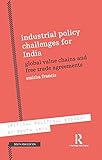Industrial policy challenges for India : global value chains and free trade agreements / Smitha Francis.
By: Francis, Smitha [author.].
Contributor(s): Francis, Smitha [author].
Publisher: New York : Routledge , 2019Description: xiv, 249 p.ISBN: 9780367343415.Subject(s): Industrial policy -- India | Free trade -- IndiaDDC classification: 338.954 Summary: This book looks at the debates on global value chains (GVCs) and free trade agreements (FTAs) as springboards for industrial development in developing countries, especially India. It connects the outcomes in GVC-led industrial restructuring and upgrading to industrial policy choices in trade and foreign direct investment (FDI) liberalisation, in particular those through FTAs. With the share of manufacturing in GDP stagnant at around 15-16 per cent since the 1980s, India’s policymakers have pinned their hopes on greater integration into GVCs to revitalise the manufacturing sector. The multiple FTAs the country has signed over the last few years, specifically the ones with the Association of Southeast Asian Nations (ASEAN), South Korea, Malaysia and Japan, have been sought to be rationalised using the same argument. The book argues that failing to factor in the industrial policy causalities involved in sustainable indigenous technology development, structural barriers to the entry into GVCs, the assessments of the available evidence on the adverse impact of trade and FDI liberalisation as well as existing FTAs on firm-level incentives for undertaking domestic production, and the industrial policy constraints imposed by FTAs can prove costly for the trajectories of developing country economies, including India.| Item type | Current location | Call number | Status | Date due | Barcode |
|---|---|---|---|---|---|
 Books
Books
|
NASSDOC Library | 338.954 FRA-I (Browse shelf) | Available | 52118 |
Includes bibliographical references.
This book looks at the debates on global value chains (GVCs) and free trade agreements (FTAs) as springboards for industrial development in developing countries, especially India. It connects the outcomes in GVC-led industrial restructuring and upgrading to industrial policy choices in trade and foreign direct investment (FDI) liberalisation, in particular those through FTAs. With the share of manufacturing in GDP stagnant at around 15-16 per cent since the 1980s, India’s policymakers have pinned their hopes on greater integration into GVCs to revitalise the manufacturing sector. The multiple FTAs the country has signed over the last few years, specifically the ones with the Association of Southeast Asian Nations (ASEAN), South Korea, Malaysia and Japan, have been sought to be rationalised using the same argument. The book argues that failing to factor in the industrial policy causalities involved in sustainable indigenous technology development, structural barriers to the entry into GVCs, the assessments of the available evidence on the adverse impact of trade and FDI liberalisation as well as existing FTAs on firm-level incentives for undertaking domestic production, and the industrial policy constraints imposed by FTAs can prove costly for the trajectories of developing country economies, including India.


There are no comments for this item.